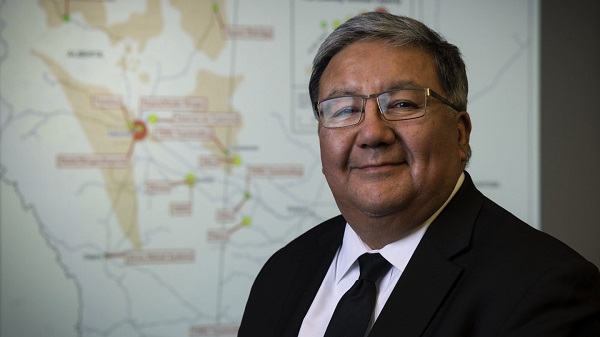Alberta
Emissions cap threatens Indigenous communities with higher costs, fewer opportunities

Dale Swampy, founder of the National Coalition of Chiefs. Photograph for Canadian Energy Centre
From the Canadian Energy Centre
National Coalition of Chiefs founder Dale Swampy says Canada needs a more sustainable strategy for reducing emissions
The head of the National Coalition of Chiefs (NCC) says Ottawa’s proposed oil and gas emissions cap couldn’t come at a worse time for Indigenous communities.
Dale Swampy says the cap threatens the combined prospect of higher costs for fuel and groceries, along with fewer economic opportunities like jobs and revenues from involvement in energy projects.
“Any small fluctuation in the economy is affected on our communities tenfold because we rely so much on basic necessities. And those are going to be the products that increase in price significantly because of this,” says Swampy, who founded the NCC in 2016 to fight poverty through partnerships with the natural resource sector.
He says that of particular concern is the price of fuel, which will skyrocket under the emissions cap because it will force reduced Canadian oil and gas production.
Analysis by S&P Global found that meeting the cap’s requirements would require a production cut of over one million barrels of oil equivalent per day (boe/d) in 2030, and 2.1 million boe/d in 2035.
“Production gets reduced, and the cost of fuel goes up,” Swampy says.
“Our concern is that everything that has to do with both fuel for transportation and fuel to heat our homes is amplified on First Nation communities because we live in rural Canada. We live in isolated communities, and it costs much more for us to operate our daily lives because we have to travel much further than anybody in a metropolitan area. So, it’s going to impact us greatly.”
Indigenous communities are already stretched financially, he says.
“What you could buy in 2019 terms of meat and produce is almost double now, and even though the inflation rate is trending downwards, we still haven’t gotten over the impact of what it costs for a bag of groceries these days,” Swampy says.
“In our communities, more than half are under the age of 21, so there’s a lot of bigger families out there struggling to just get food on the table.”
The frustrating timing of the cap is that it comes amid a rising tide of Indigenous involvement in Canadian oil and gas. Since 2022, more than 75 Indigenous communities in Alberta and B.C. have agreed to become part owners of energy projects.
Three major projects – the Trans Mountain Pipeline Expansion, Coastal GasLink Pipeline and LNG Canada export terminal – together have spent more than $11 billion with Indigenous and local businesses.
“We’re at a turning point right now. There’s a real drive towards getting us involved in equity opportunities, employment opportunities, and contracting opportunities,” Swampy says.
“Everybody who didn’t talk to us in the past is coming to our front door and saying, ‘Do you want to work with us?’ It couldn’t come at a worse time when we have this opportunity. The emissions cap is going to reduce the amount of activity, and it’s going to reduce the amount of investment,” he says.
“We’re part of that industry now. We’re entrenched in it now, and we have to support it in order to support our people that work in this industry.”
Economic growth, and more time, is needed to fund development of low emissions energy sources without ruining the economy, he says.
“I think we need more consultation. We’d like to see them go back to the table and try to incorporate more of a sustainable strategy for emission reductions,” Swampy says.
“We’re the only country in the world that’s actually incorporating this type of legislation. Do you think the rest of the world is going to do this type of thing? No, they’re going to eat our lunch. They’re going to replace the production that we give up, they’re going to excel in the economy because of it, and they won’t talk about significant emission reduction initiatives.”
2025 Federal Election
Next federal government should recognize Alberta’s important role in the federation

From the Fraser Institute
By Tegan Hill
With the tariff war continuing and the federal election underway, Canadians should understand what the last federal government seemingly did not—a strong Alberta makes for a stronger Canada.
And yet, current federal policies disproportionately and negatively impact the province. The list includes Bill C-69 (which imposes complex, uncertain and onerous review requirements on major energy projects), Bill C-48 (which bans large oil tankers off British Columbia’s northern coast and limits access to Asian markets), an arbitrary cap on oil and gas emissions, numerous other “net-zero” targets, and so on.
Meanwhile, Albertans contribute significantly more to federal revenues and national programs than they receive back in spending on transfers and programs including the Canada Pension Plan (CPP) because Alberta has relatively high rates of employment, higher average incomes and a younger population.
For instance, since 1976 Alberta’s employment rate (the number of employed people as a share of the population 15 years of age and over) has averaged 67.4 per cent compared to 59.7 per cent in the rest of Canada, and annual market income (including employment and investment income) has exceeded that in the other provinces by $10,918 (on average).
As a result, Alberta’s total net contribution to federal finances (total federal taxes and payments paid by Albertans minus federal money spent or transferred to Albertans) was $244.6 billion from 2007 to 2022—more than five times as much as the net contribution from British Columbians or Ontarians. That’s a massive outsized contribution given Alberta’s population, which is smaller than B.C. and much smaller than Ontario.
Albertans’ net contribution to the CPP is particularly significant. From 1981 to 2022, Alberta workers contributed 14.4 per cent (on average) of total CPP payments paid to retirees in Canada while retirees in the province received only 10.0 per cent of the payments. Albertans made a cumulative net contribution to the CPP (the difference between total CPP contributions made by Albertans and CPP benefits paid to retirees in Alberta) of $53.6 billion over the period—approximately six times greater than the net contribution of B.C., the only other net contributing province to the CPP. Indeed, only two of the nine provinces that participate in the CPP contribute more in payroll taxes to the program than their residents receive back in benefits.
So what would happen if Alberta withdrew from the CPP?
For starters, the basic CPP contribution rate of 9.9 per cent (typically deducted from our paycheques) for Canadians outside Alberta (excluding Quebec) would have to increase for the program to remain sustainable. For a new standalone plan in Alberta, the rate would likely be lower, with estimates ranging from 5.85 per cent to 8.2 per cent. In other words, based on these estimates, if Alberta withdrew from the CPP, Alberta workers could receive the same retirement benefits but at a lower cost (i.e. lower payroll tax) than other Canadians while the payroll tax would have to increase for the rest of the country while the benefits remained the same.
Finally, despite any claims to the contrary, according to Statistics Canada, Alberta’s demographic advantage, which fuels its outsized contribution to the CPP, will only widen in the years ahead. Alberta will likely maintain relatively high employment rates and continue to welcome workers from across Canada and around the world. And considering Alberta recorded the highest average inflation-adjusted economic growth in Canada since 1981, with Albertans’ inflation-adjusted market income exceeding the average of the other provinces every year since 1971, Albertans will likely continue to pay an outsized portion for the CPP. Of course, the idea for Alberta to withdraw from the CPP and create its own provincial plan isn’t new. In 2001, several notable public figures, including Stephen Harper, wrote the famous Alberta “firewall” letter suggesting the province should take control of its future after being marginalized by the federal government.
The next federal government—whoever that may be—should understand Alberta’s crucial role in the federation. For a stronger Canada, especially during uncertain times, Ottawa should support a strong Alberta including its energy industry.
Alberta
Province announces plans for nine new ‘urgent care centres’ – redirecting 200,000 hospital visits

Expanding urgent care across Alberta
If passed, Budget 2025 includes $17 million in planning funds to support the development of urgent care facilities across the province.
As Alberta’s population grows, so does the demand for health care. In response, the government is making significant investments to ensure every Albertan has access to high-quality care close to home. Currently, more than 35 per cent of emergency department visits are for non-life-threatening conditions that could be treated at urgent care centres. By expanding these centres, Alberta’s government is enhancing the health care system and improving access to timely care.
If passed, Budget 2025 includes $15 million to support plans for eight new urgent care centres and an additional $2 million in planning funds for an integrated primary and urgent care facility in Airdrie. These investments will help redirect up to 200,000 lower-acuity emergency department visits annually, freeing up capacity for life-threatening cases, reducing wait times and improving access to care for Albertans.
“More people are choosing to call Alberta home, which is why we are taking action to build capacity across the health care system. Urgent care centres help bridge the gap between primary care and emergency departments, providing timely care for non-life-threatening conditions.”
“Our team at Infrastructure is fully committed to leading the important task of planning these eight new urgent care facilities across the province. Investments into facilities like these help strengthen our communities by alleviating strains on emergency departments and enhance access to care. I am looking forward to the important work ahead.”
The locations for the eight new urgent care centres were selected based on current and projected increases in demand for lower-acuity care at emergency departments. The new facilities will be in west Edmonton, south Edmonton, Westview (Stony Plain/Spruce Grove), east Calgary, Lethbridge, Medicine Hat, Cold Lake and Fort McMurray.
“Too many Albertans, especially those living in rural communities, are travelling significant distances to receive care. Advancing plans for new urgent care centres will build capacity across the health care system.”
“Additional urgent care centres across Alberta will give Albertans more options for accessing the right level of care when it’s needed. This is a necessary and substantial investment that will eventually ease some of the pressures on our emergency departments.”
The remaining $2 million will support planning for One Health Airdrie’s integrated primary and urgent care facility. The operating model, approved last fall, will see One Health Airdrie as the primary care operator, while urgent care services will be publicly funded and operated by a provider selected through a competitive process.
“Our new Airdrie facility, offering integrated primary and urgent care, will provide same-day access to approximately 30,000 primary care patients and increase urgent care capacity by around 200 per cent, benefiting the entire community and surrounding areas. We are very excited.”
Alberta’s government will continue to make smart, strategic investments in health facilities to support the delivery of publicly funded health programs and services to ensure Albertans have access to the care they need, when and where they need it.
Budget 2025 is meeting the challenge faced by Alberta with continued investments in education and health, lower taxes for families and a focus on the economy.
Quick facts
- The $2 million in planning funds for One Health Airdrie are part of a total $24-million investment to advance planning on several health capital initiatives across the province through Budget 2025.
- Alberta’s population is growing, and visits to emergency departments are projected to increase by 27 per cent by 2038.
- Last year, Alberta’s government provided $8.4 million for renovations to the existing Airdrie Community Health Centre.
Related information
-

 Alberta2 days ago
Alberta2 days agoAlberta Institute urging Premier Smith to follow Saskatchewan and drop Industrial Carbon Tax
-

 Addictions2 days ago
Addictions2 days agoShould fentanyl dealers face manslaughter charges for fatal overdoses?
-

 Also Interesting1 day ago
Also Interesting1 day agoThe bizarre story of Taro Tsujimoto
-

 Alberta2 days ago
Alberta2 days agoAlbertans have contributed $53.6 billion to the retirement of Canadians in other provinces
-

 2025 Federal Election2 days ago
2025 Federal Election2 days agoChinese Gangs Dominate Canada: Why Will Voters Give Liberals Another Term?
-

 Health1 day ago
Health1 day agoRFK Jr. Drops Stunning Vaccine Announcement
-

 Energy2 days ago
Energy2 days agoEnergy, climate, and economics — A smarter path for Canada
-

 2025 Federal Election22 hours ago
2025 Federal Election22 hours agoSoaked, Angry, and Awake: What We Saw at Pierre Poilievre’s Surrey Rally





